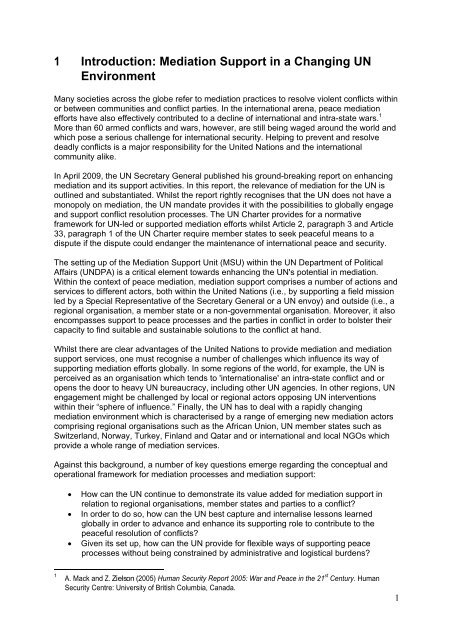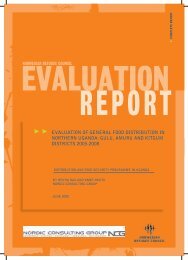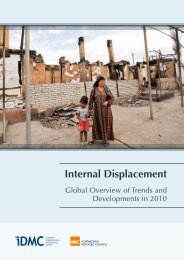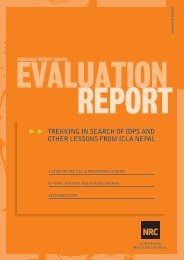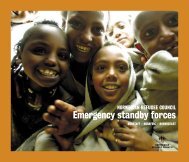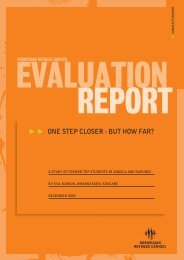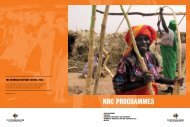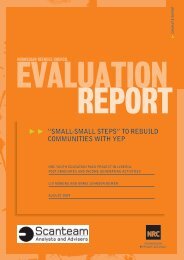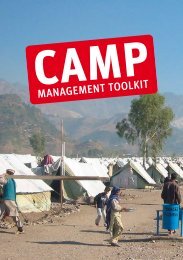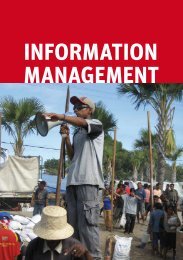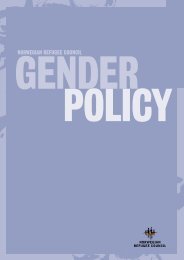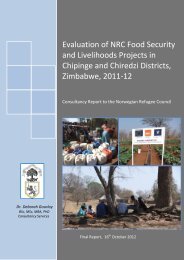Download report here - Norwegian Refugee Council
Download report here - Norwegian Refugee Council
Download report here - Norwegian Refugee Council
- No tags were found...
Create successful ePaper yourself
Turn your PDF publications into a flip-book with our unique Google optimized e-Paper software.
1 Introduction: Mediation Support in a Changing UNEnvironmentMany societies across the globe refer to mediation practices to resolve violent conflicts withinor between communities and conflict parties. In the international arena, peace mediationefforts have also effectively contributed to a decline of international and intra-state wars. 1More than 60 armed conflicts and wars, however, are still being waged around the world andwhich pose a serious challenge for international security. Helping to prevent and resolvedeadly conflicts is a major responsibility for the United Nations and the internationalcommunity alike.In April 2009, the UN Secretary General published his ground-breaking <strong>report</strong> on enhancingmediation and its support activities. In this <strong>report</strong>, the relevance of mediation for the UN isoutlined and substantiated. Whilst the <strong>report</strong> rightly recognises that the UN does not have amonopoly on mediation, the UN mandate provides it with the possibilities to globally engageand support conflict resolution processes. The UN Charter provides for a normativeframework for UN-led or supported mediation efforts whilst Article 2, paragraph 3 and Article33, paragraph 1 of the UN Charter require member states to seek peaceful means to adispute if the dispute could endanger the maintenance of international peace and security.The setting up of the Mediation Support Unit (MSU) within the UN Department of PoliticalAffairs (UNDPA) is a critical element towards enhancing the UN's potential in mediation.Within the context of peace mediation, mediation support comprises a number of actions andservices to different actors, both within the United Nations (i.e., by supporting a field missionled by a Special Representative of the Secretary General or a UN envoy) and outside (i.e., aregional organisation, a member state or a non-governmental organisation. Moreover, it alsoencompasses support to peace processes and the parties in conflict in order to bolster theircapacity to find suitable and sustainable solutions to the conflict at hand.Whilst t<strong>here</strong> are clear advantages of the United Nations to provide mediation and mediationsupport services, one must recognise a number of challenges which influence its way ofsupporting mediation efforts globally. In some regions of the world, for example, the UN isperceived as an organisation which tends to 'internationalise' an intra-state conflict and oropens the door to heavy UN bureaucracy, including other UN agencies. In other regions, UNengagement might be challenged by local or regional actors opposing UN interventionswithin their sp<strong>here</strong> of influence. Finally, the UN has to deal with a rapidly changingmediation environment which is characterised by a range of emerging new mediation actorscomprising regional organisations such as the African Union, UN member states such asSwitzerland, Norway, Turkey, Finland and Qatar and or international and local NGOs whichprovide a whole range of mediation services.Against this background, a number of key questions emerge regarding the conceptual andoperational framework for mediation processes and mediation support:How can the UN continue to demonstrate its value added for mediation support inrelation to regional organisations, member states and parties to a conflict?In order to do so, how can the UN best capture and internalise lessons learnedglobally in order to advance and enhance its supporting role to contribute to thepeaceful resolution of conflicts?Given its set up, how can the UN provide for flexible ways of supporting peaceprocesses without being constrained by administrative and logistical burdens?1A. Mack and Z. Zielson (2005) Human Security Report 2005: War and Peace in the 21 st Century. HumanSecurity Centre: University of British Columbia, Canada.1


